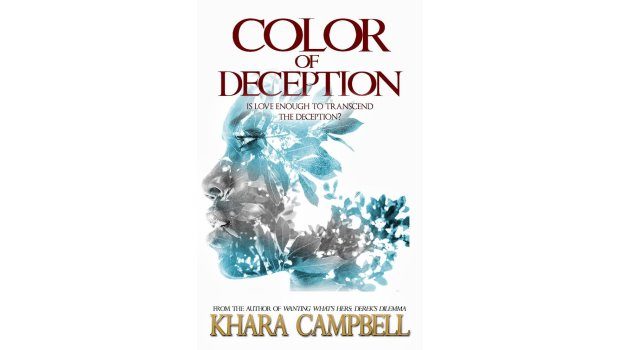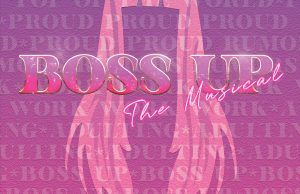Color of Deception by Khara Campbell

Grief strikes everyone differently, for Pete it struck him to the core. After his beloved wife Moriah was tragically killed in a car accident, the driver and his entire ethnicity become the target of Pete’s wrath.
When Pete buried his wife, all love, compassion, empathy, joy, he ever possessed, was buried along with her. Family tries to bring him out of his grief, but his stubbornness allows it to keep a chokehold on his life.
Carlisha, the young black, orphaned woman that Moriah had welcomed into her heart and their home as a part of their family, is now a bullseye for Pete’s grief. But despite his now callous attitude toward her, Carlisha still sees Pete as the man that once was a father figure in her life.
Tragedy strikes yet again, and a budding romance and a series of deceptions leave Pete questioning the target of his wrath. Soon Carlisha is forced to accept her life as an orphan yet again after the man she loves turns his back on her when she needs him the most. And love Pete never thought would resonate in his heart again blossoms in more ways than one as he fights for someone that represents the very race that he has come to hate.
Excerpt:
The knocking on the door interrupted Pete from his Sunday morning routine of coffee, sports news on TV and reading The Washington Post. He sucked his teeth in frustration and stood up effortlessly, which was great for his forty-eight-year-old body, which he refused to put any extra effort in keeping in shape. He stood tall at six feet.
Pete walked over to the front door, already knowing who was behind it before he opened it. He cussed under his breath. Part of him really wanted to ignore the knocking on the door and pretend like he wasn’t home. But he was sure if he didn’t answer now, she would be back later, no doubt. He unlocked and slowly opened the door, not even trying to mask the look of irritation on his face.
“Good morning Uncle Pete, I came to see if you would like to go to church with me today,” Rachel said, beaming. Her bright smile and flowing golden-blonde hair almost overshadowed the early morning sun shining down on the front porch.
“I don’t know why you insist on coming here every Sunday morning and Wednesday evening pestering me about some damn church,” Pete howled. “You know good and goddamn well that I’m not going. Yes I said goddamn, is that blasphemy like you call it? Well I don’t care!” Pete turned and walked away from the door and left Rachel standing on the porch.
Rachel walked in the house and closed the door behind her, she wasn’t the least bit fazed by her Uncle’s abrasive attitude. She’d been coming to visit him faithfully every week for almost a year since her Aunt Moriah was killed in a car accident. She felt it was now her responsibility to check up on him, but more importantly to continue praying for him because when his wife died he had turned into a completely different person.
“What the hell! When did my neighborhood get filled up with all these niggers!?” Pete yelled when he looked out the bay window and noticed a young Black couple walking their dog.
“Uncle Pete! How dare you? That is offensive, rude and not Christ-like.”
“Well, I’m offensive, rude and not Christ-like, so I can say whatever the hell I want,” Pete defended. “I’ve been living here for ten years and never have I seen so many black people. Did they all win the lotto or get rich picking cotton?” Pete mocked, he took a seat back on the couch.
“How dare you talk like that? Aunt Moriah is probably rolling around in her grave.” Rachel took a seat in the armchair across from her uncle.
“Well she wouldn’t be there if a nigger hadn’t crashed into her car,” Pete snapped.
“That was an accident. The driver of the other vehicle had a heart attack behind the wheel. You shouldn’t be blaming anyone for what happened. Two lives were lost that day,” Rachel reasoned. “And calling black people the N word is not right. You need to pray and ask God to heal your heart. You shouldn’t lash out because of Aunt Moriah’s death like that. And you can’t blame every black person for what happened.”
Pete took a sip of his coffee and ignored everything Rachel just said. All he knew was a black man was driving the car that crashed into his wife, whether he had a heart attack or not, he still caused the death of the love of his life. That bastard was drunk; I still don’t believe he had a heart attack! Now he was left with no wife, no kids and only a pestering niece that insisted on bothering him every freaking week about going to her damn church. He considered going to church with her; maybe that would get her off his back.
“I can do and say whatever the hell I want! This is my house!” He spat.
“I bet you wouldn’t say the N word in public because you know it’s wrong. So you shouldn’t say it in private either!”
Pete sucked his teeth loudly. Out of respect for his niece and the kind heart of his beloved dead wife, he held back saying a few cuss words to Rachel. Rachel’s father was his dearly departed wife Moriah’s brother and as much as it pained him to have to deal with Rachel pestering him to go to church every week, he was happy to have Moriah’s family around, it helped him deal with some of the pain of losing his wife so soon and so unfairly. If the driver of that car hadn’t died in the accident he probably would’ve killed the man himself for killing his wife.
Pete would never forget the phone call he received telling him about the accident. Moriah had left their office at Minute Print, the small printing company they operated together to make a deposit at the bank that evening. She was on her way back to the office when the accident happened. The driver that had the heart attack, or drunk driver, veered into her lane hitting her head on. She died instantly. Pete’s whole world turned gray that day. He wanted to die with his wife. Then his anger shifted to every black man that reminded him of the man that hit his wife’s car. Then he just began to despise the sight of any black person that would remind him of the black man that took his wife’s life. Even Pete was surprised at how quickly his anger for the black race grew, but he then began to not care because the fact still remained that his love, his queen, his life, the woman he wanted to have children with, the woman he wanted to grow old with was gone and she was never coming back.
“Rachel – why do you insist on bothering me every Sunday? Get the hint, I am not interested in going to church.” Pete took another sip of his coffee and went back to reading his newspaper.
“Uncle Pete, you know Aunt Moriah loved going to church, she sang in the choir. I’m sure she doesn’t want you not to go anymore.”
“Moriah’s not here, Rachel. And every day I am painfully reminded of that, especially when I look out my own window and see all those black people taking over my neighborhood. You ever thought that maybe I don’t like to go to church anymore is because it reminds me too much of her? When the choir goes up to sing, I still try to find her in the group, but then I remember, yet again, that she’s gone.” Pete pushed down the emotion to cry with the memory of his wife. It was a couple weeks shy of a year since her death, but to Pete, sometimes it still felt like it just happened yesterday.
“I’m sorry, I never thought about it like that.” Rachel was sincere. “Well, will you at least be coming over for dinner later?”
Pete wanted to say no right away, but figured it would be good for him to get a home cooked meal. “What time is it?”
“Four.”
“Alright, I will come over for dinner,” he conceded.
Rachel got up and gave her uncle a quick hug. “Thanks! And don’t be late. I’ll see you later.” She turned and walked toward the door.
“I said I’ll be there all right – I’ll be there on time,” Pete answered, relieved that she was leaving.
“Okay!”














